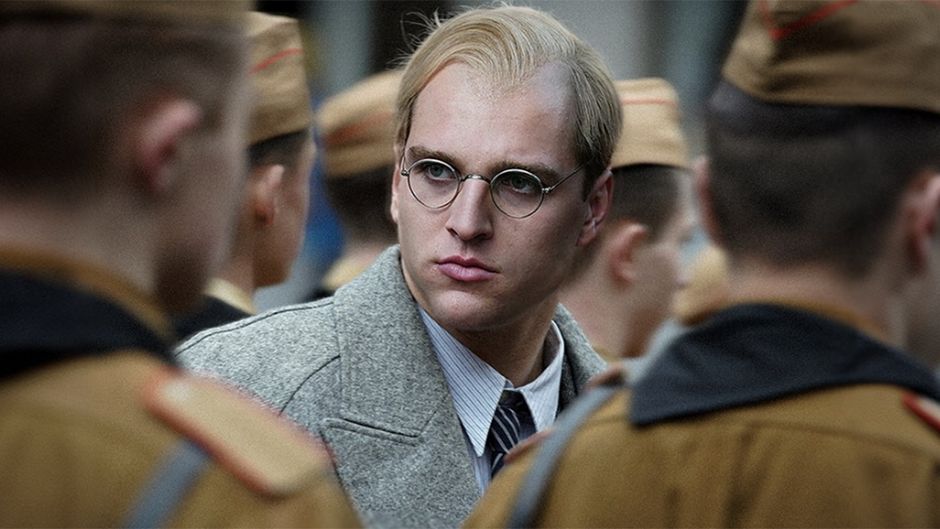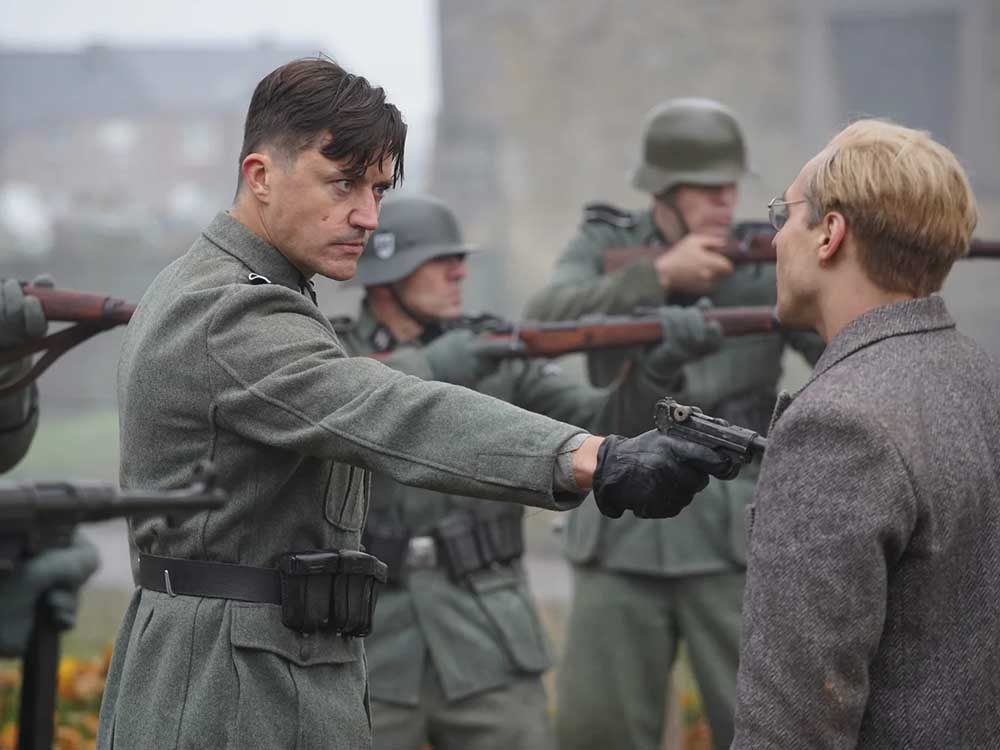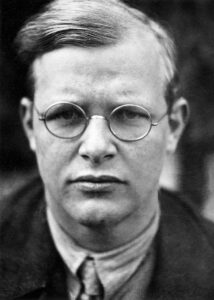
by John Jackman
Movies are not academic documentaries; they are storytelling and drama. Filmmakers must always take some license to fit a complex story into two hours, and indeed is it hard not to add embellishments that make for better cinema: “Never let the facts get in the way of a good story” said Mark Twain. Making a movie about a revered historical religious figure is a daunting challenge; someone will always be unhappy with the way you tell the story of their favorite religious leader.
I say this because I’ve done it; for my 2009 movie Wesley we struggled to compress just a few years of John Wesley’s complex story into two hours. Many lauded the film, others hated it – often scholars who complained that their favorite hobby horse had been overlooked. So I approach reviewing Bonhoeffer: Pastor, Spy, Assassin with some caution, particularly because I have strong opinions about Bonhoeffer, who I studied extensively in seminary, and whose writings profoundly affected my own theology.
The timing of the release of Bonhoeffer is part of the problem, though the filmmakers might have foreseen that. Eric Metaxas’ book Bonhoeffer: Pastor, Martyr, Prophet, Spy (2011) has been lambasted by scholars, and has been used by the Christian Right to support violent action. Metaxas himself has deepened the controversy by seeming to call for violent bloodshed to defend Donald Trump’s false claim that he won the 2020 election, and his advocacy of what sounds like a totalitarian takeover.
Recently, a large group of scholars and the descendants of the Bonhoeffer family publicly decried the misuse of Bonhoeffer’s name and thought to support Christian Nationalism (links at end of article). They condemned Metaxas’ book and the new movie – though unfortunately none of them had been able to preview the movie at the time. The similarity of titles was a mistake, and poor decisions by Angel Films in the early promotion (showing Bonhoeffer holding a pistol, or wearing an explosive vest for instance) made it seem that the movie was based on Metaxas’ book. A special preview at the Museum of the Bible in Washington last month stirred that pot even more, since Eric Metaxas was the speaker and host.
The film’s writer and director Todd Komarnicki (the writer of Sully and producer of Elf) denied any association. Komarnicki recently told podcaster Tripp Fuller that the movie was not based on Metaxas’ work at all. He seemed offended by the idea, maintaining that the movie was his personal interpretation of Bonhoeffer. “I’m not trying to say this is the definitive Bonhoeffer,” he said, “but rather, this is the man that I encountered in his writing, and how it touched me as an artist and as a Christian.” But this is the problem: despite his extensive writings, Bonhoeffer is at times a tabula rasa on which readers can project their own opinions. And I am willing to bet that Komarnacki read the Metaxas book before doing other research.
The timing of the release is also interesting because it happens just after an election that some feel marks the beginning of the end of the great American Experiment. A man who openly admires authoritarian rulers, who keeps a copy of Hitler’s speeches on his bedstand, has now been elected president for the second time – but this time with many traditional guard rails removed. Hitler was also regarded by the right as a “savior sent by God” and many German churches were swayed to not only acquiesce to Hitler, but to regard him as God’s agent and hand. Nazi Bibles were published with revisions, including a couple of extra commandments. Now, all this is shown clearly in Komarnicki’s movie; and most people watching the movie will note the similarities to recent events.
I went to see Bonhoeffer at a preview just before the official wide release. I felt that I had to see the movie for myself before passing any judgment. First, let me address Bonhoeffer just as a movie; then I will look at where Komarnicki fails to capture the complex subject of his film.
The movie is actually pretty well done, especially when compared to the normal “faith film” of the past. Production values are excellent, the acting is generally quite good, and the direction is mostly good. Jonas Dassler (Dietrich Bonhoeffer) is compelling in many scenes, though there are places where the acting and the writing seem clichéd. The film uses a “flashback” structure (from Bonhoeffer in prison) to collapse the time, but in online reviews many people found this confusing – some because they didn’t know the story, and other because they did know the story and were confused by liberties taken.

Historically, the script is pretty accurate for a film of this nature – but that’s quite a low standard! Komarnicki takes many historical liberties that were not needed for condensing the story. The film does show Bonhoeffer’s time at Union Seminary in New York and his friendships in Harlem with the Abyssinian Baptist Church. This is mostly fictionized, however, and while it shows his exposure to American racism, it falls short in conveying the strong pacifist resistance to racism that Bonhoeffer witnessed, which was a huge shaping influence on his theology.
So here’s where the film goes astray: Bonhoeffer was a profound pacifist, and I have the feeling that (like many people), Komarnicki doesn’t adequately understand pacifism. Bonhoeffer had been in touch with Mahatma Gandhi in the early 1930s, and learned more from the saints at Abbysinian Baptist Church (MLK didn’t invent peaceful resistance). Adam Clayton Powell Sr. has been credited with teaching Bonhoeffer about love of enemies, resisting systems of injustice, Christ’s presence with the poor, and the idea of “cheap grace”. Like Gandhi, Bonhoeffer believed “There are many causes that I am prepared to die for, but no causes that I am prepared to kill for.” In the movie, Bonhoeffer enthusiastically abandons that position, and the complex, carefully thought out theology he had espoused, and participates actively in the plot to kill Hitler. Komarnicki’s Bonhoeffer talks about the necessity to have “dirty hands,” an ethical concept that the real Bonhoeffer never used or referred to that I can find. Miles Werntz writes in Christianity Today,
Rather than depicting a man of deep theological convictions and subtle intellect, Bonhoeffer tells the story of a man for whom moral convictions are a flexible and useful tool, a man whose actions are determined not by concerns for the church’s witness but by perceived historical necessity. It is the story of a Bonhoeffer willing to do anything—including disavow the teachings of Jesus as he understood them—to assassinate Adolf Hitler.
Christianity Today
Victoria Barnett, the editor of Bonhoeffer’s collected works, describes the movie “as a very romanticized ‘Christian hero’ fantasy.”
[Bonhoeffer’s] legacy is actually a very critical one of the failures of his church in Christianity. How would we read him if we were not looking for a hero story, but reading him for insight and guidance into how to be a good person in this world? It’s a fantasy. They’ve made lots of things up to actually contradict who he was and what he did.”
The Forward
But – didn’t Dietrich Bonhoeffer actively participate in the plot to kill Hitler? That’s the popular view. His brother-in-law Hans von Dohnanyi did. But much of the popular myth of Bonhoeffer is imagination, people filling in blanks. Scholars today point out that there is no evidence that Dietrich actually helped or actively participated in the plot. He probably knew about it, but even that is speculation. He was active in the resistance, and knew many people involved in the plot, but he certainly did not abandon his own theology, as he seems to in the movie. Instead, he confirmed his continued belief in pacifism in letters from prison. Bonhoeffer’s own actions of Christian resistance—spreading information to international contacts, and assisting with sending Jews to Switzerland—were consistent with his long-standing convictions.
Bonhoeffer: Preacher, Spy, Assassin does not seem to promote Christian nationalism (as some feared), and does indeed get many things right. However, it fails to hit the mark in significant ways, in particular understanding how profound Bonhoeffer’s bravery was. Like Jan Hus, he stood publicly and courageously against the might of empire, knowing that he would likely pay the ultimate price. He proclaimed truth in the face of fascism. Miles Werntz, writing in Christianity Today, concludes:
What we needed was a film about a man concerned with how God might be calling the church to be steadfast amid the great temptation to mold our faith to our politics.
Christianity Today
Warren Throckmorton voices a slightly different perspective:
It is good that the movie is triggering discussion about how to respond to a totalitarian regime. We are now living in the shadow of that possibility. This is new ground for American Christians and we need to deal with it.
The Throckmorton Initiative
I would encourage church groups to see the movie, but to be forearmed with solid information and an awareness of the inaccuracies — and use it as a springboard for conversation. I can see some very fruitful discussions happening on difficult topics, especially in our current times. I would also encourage Christians to read Bonhoeffer’s actual writings rather than third-party interpretations. In our time, the Church needs to wrestle with his profound thought in a significant way.
___________________________________________________
John Jackman is pastor of Trinity Moravian Church in Winston-Salem, NC and organizer of the Debt Jubilee Project. He wrote and directed Wesley (2009) and Newton’s Grace (2013) as well as numerous documentaries. He studied Dietrich Bonhoeffer’s writings under Dr. Charles Hargis at Moravian Theological Seminary.
___________________________________________________
LINKS
Letter from the Bonhoeffer Family:
https://drive.google.com/file/d/1SIKs7_yO3nbPFjRb4FV8wi-WKwghBvUP/view
Letter from Bonhoeffer Scholars:
https://bonhoeffersociety.org/2024/10/16/sign-our-petition-stop-misusing-dietrich-bonhoeffer-to-support-political-violence-and-christian-nationalism/
Lead Actors of Movie Condemn Christian Nationalism:
https://bonhoeffersociety.org/2024/11/04/statement-lead-actors-in-bonhoeffer-spy-pastor-assassin-speak-out-together-against-the-misuse-of-bonhoeffers-legacy/
There’s No Such Thing As A Bonhoeffer Moment – Victoria Barnett
___________________________________________________
Recommended Reading:
Bonhoeffer the Assassin? Challenging the Myth, Recovering His Call to Peacemaking by Mark Thiessen Nation, Anthony G. Siegrist, Daniel P. Umbel (Baker Academic)
Dietrich Bonheoffer: A Biography by Eberhard Bethge (Fortress Press)
Dietrich Bonhoeffer: A Spoke in the Wheel by Renate Wind (Eeerdman)
Theologian of Resistance: The Life and Thought of Dietrich Bonhoeffer by Christiane Tietz (Fortress Press)
Strange Glory: A Life of Dietrich Bonhoeffer. By Charles Marsh (Knopf Doubleday Publishing)
Bonhoeffer’s Black Jesus: Harlem Renaissance Theology and an Ethic of Resistance by Reggie Williams (Baylor University Press)
___________________________________________________
Recommended Viewing:
Bonhoeffer: Pastor, Pacifist, Nazi Resister a documentary by Martin Doblmeier.




